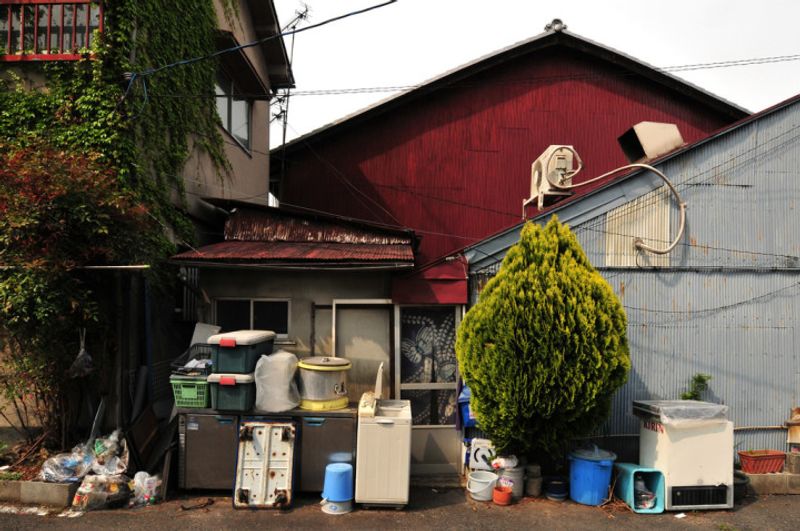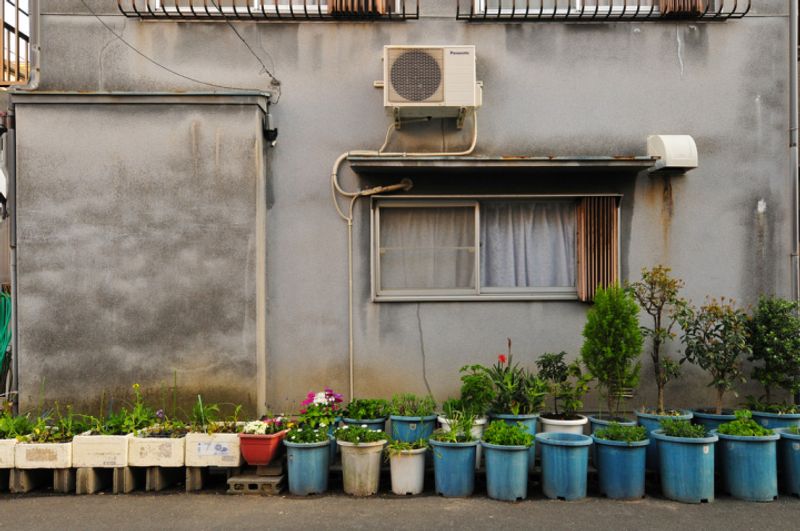Dec 22, 2016
As Japan prepares for the 'big clean' (大掃除) are we likely to follow suit?
I posted a Tweet out recently proclaiming the day of oosouji/大掃除 (big clean) to be my least favorite day of the year in Japan. Judging by the responses from other expats in Japan, I’m not alone.
An earlier post on City-Cost (Clean Up Your Act: Essential Products For Keeping The Home Clean In Japan) makes for a good introduction to oosouji/大掃除 in Japan and, briefly, why it should happen at a time of year when the last thing we might want to be doing is applying elbow grease to some stubborn kitchen grease. What I will say here in summary is that oosouji/大掃除 is the Japanese equivalent of the ‘spring clean’. Except it happens in winter.

Oh to be single!
Prior to writing this, I asked Japanese friends whether or not they did 大掃除. The response was largely in the negative. Without wanting to pander to a stereotype, they are mostly young, single men. Some, however, did say that they might be heading back to hometowns to help out parents when it comes time for them to perform their annual scrub down of the abode.
One might also question any practical need for single Japanese (of any age) to be getting too worked up about the state of cleanliness of their homes. Where in other parts of the world the entertaining of friends and romantic interests could well take place in one’s home, here in Japan we see significantly less of this. Urban lifestyle in particular is very much geared towards getting people out of their homes, even when it comes to a bit of ‘me’ time. We can see this in the manga kissa (Internet cafes), cheap family restaurants with even cheaper ‘drink bars’, game centers, batting centers, spas, public baths, solo karaoke plans … the list is long and varied. With such resources on tap (hopefully cleaned by people paid to do so), and tight living spaces that should be easy to maintain anyway, it’s unsurprising to hear those around me express little interest in 大掃除 (to say nothing of the limited appeal in scrubbing surfaces).
Of course, nobody wants to bring a love interest back to a place of questionable hygiene, so they don’t. And this goes back to the point above; in Japan there’s little need. Introducing a potential partner to one’s personal space can be saved for much later in Japan, by which point the state of one’s abode may not be such a make or break issue.
Who's doing oosouji/大掃除 then?
The results of a 2015 survey conducted by Lifemedia that asked the direct question, ‘Do you do oosouji/大掃除?’, showed 50.6% of respondents (male/female) said they do. 16.4% said they clean regularly anyway, so no. 15.8%, a straight up, ‘No.’. 17.2% responded, ‘Don’t know.’, (I speculate that this means they were undecided about doing it that particular year).
The survey gives no definitive indication as to the age and social circumstances of respondents, although sample comments come from those between the ages of 30 and 60. Whatever the age, over 50% seems, to me at least, a large portion with the potential to cover a spectrum of society. That only around 16% gave a definitive, ‘No.’, only lends further weight to the place of 大掃除 in the lives' of our hosts. Perhaps this 16% is the collective voice of those like my friends.
Does it count if we pay someone else to do it?
When life becomes hard, one of the easiest of solutions has always been to throw money at it to make it (the hard aspect) go away. One could do the same with 大掃除; pay someone to do it for you.
In the same survey, Lifemedia posed a question to this effect; ‘Do you call in the cleaning professionals?’. 9.6% of respondents said they do. 28.8% said they don’t but would like to try it this time around. 61.6% said no and that they have no desire to either.
I don’t know how much it costs to have a team come in and clean your house in Japan. Maybe it’s a lot. Maybe it’s surprisingly cheap. Whatever the price, one suspects that 大掃除 is more than just the physical act of cleaning and that there is something that prevents many who could comfortably afford to, from calling in the professionals.
As was mentioned in the earlier post, there’s a spiritual aspect at play in Japan, where 大掃除 is seen as the preparation for a visit from the Shinto God Toshigami (年神) (although in my experience it’s been hard to find anything spiritual behind the washing machine). And while it might be easy to fire the accusation that our hosts take spirituality (at least in the practiced sense) à la carte (referring to the oft used phrase about the Japanese, 'born Shinto, wedded Christian, buried Buddhists'), it would be hard to put up even the slighted pretext of the spiritual if all you’re doing is paying for a service.
Regardless any spiritual aspect at play, if the expat spends long enough in Japan, they’ll come to see a society that has very much fallen into the rhythms of season, habit, and custom. August is the time to go to the beach (it really is in Japan). New Year is the time for a ‘spring clean’. In this way, 大掃除 is perhaps just a part of what it is to be Japanese. While the single, freewheeling locals may find it easier to separate themselves from such entrenched patterns when it suits (and let’s be honest, 大掃除 doesn’t stand comparison to the appeal of hitting the beach with friends), for families this is harder to do. Children in school, for example, join with teachers and staff (even the Principal) before winter holidays to ‘spring clean’ the school building, something that will likely seem unfathomable to counterparts in the West, and something to be backed up by parents in the home. Paying someone else to do it, wouldn’t set the best ‘life’ example.
And so to us expats, unburdened by many of the entrenched and unwritten rules of Japanese life, are we likely to find ourselves doing 大掃除? Perhaps for us too, this will be determined by partners and family.
In the interests of adding something practical to this piece, below are some cleaning tips that I saw on the TV program ソレダメ!(sore dame / Don’t do that!) (TV TOKYO Dec. 15, 2016). You might see the tagline, あなたの日常間違った常識 (anato no nichijyou machigatta jyoushiki / your everyday mistakes in common sense) next to the program name, as program hosts and specialists attempt correct the errors made in things which we take to be common sense.
The edition I saw tackled some cleaning issues.
Baby powder to clean your sofas, carpets and rugs
As I watched, I was nervously eyeing up my relatively new (and as yet, not totally deformed) sofa. The idea of showering the rich brown covers with baby powder didn’t sit too well but that’s the idea the program was conveying.
Yes, rubbing some baby powder into your sofa, carpets, and rugs is apparently a way to increase your vacuum cleaner’s ability to draw out unwanted particles within. You see, the powder is so fine that it penetrates deep into the fibers of the object of your cleaning. When the vacuum gets hold of them, they help to bring out other unwanted foreign bodies.
Still, there’s no way this is getting tested on the (relatively) new sofa. I'll save it for the cheap rug instead.

Plant pot, cup, glass, 'ring' stains
Plant pots, and kind of cup, glass, vessel that might leave behind a ring of shame announcing to all that you haven’t moved said item for a long time.
The TV told me to head to the fridge and crack out the mayonnaise. I’m not sure if we need be brand-specific but we are to squirt the mayonnaise directly onto the ring of shame so that it looks like a ring of, well, mayonnaise. Next step, a dry cloth, emphasis here on the dry, is placed/pressed on top of said ring. And then we wait. 15 minutes. Remove cloth, give things a cursory wipe and the ring of shame will hopefully have gone.
Scratches in the flooring
Let’s be clear, we’re not talking about significant scratches or gouges. You’ll just have to live with those and hope they don’t do too much damage to your deposit when it comes time to move out. No, this ‘remedy’ is for the lighter scratch, the almost inevitable result of a careless TV slide, a bit of grit stuck in a slipper sole, or that time you tried some new, fresh-out-of-the-box shoes, in the home!
The solution is apparently simple, tea bags. Not green tea, rather, 紅茶 / koucha - black tea or simply, tea. Wet (or used) just give those light (we repeat, light) scratches a bit of scrub and see what happens.
The 100 yen way to clean your mosquito nets
Cleaning mosquito nets is a massive, and often, messy task. To date, my method has been a bucket of hot water (hot simply because it’s a cold time of year to be cleaning) and scrubbing brush. What ensues is a partial retraction of dirt, most of which ends up on one’s clothes and/or surrounding windows, and a mosquito net dripping in dirty water. It’s essentially a thankless task and one can’t help but feel that a bit of grime decreases mosquito penetration anyway.
The people on ソレダメ!told of a much better way; the etiquette brush. For my sins I didn’t know what this was referring to at first. It turns out to be one of those brushes you use to spruce up the suit and rid it of clingy particles. You can get them from any 100 yen store worthy of the name.
The fine brush fibre/strands work better than a regular brush at getting into the meshing of your mosquito net. Have a bucket of water on standby to clean the brush.
Any oosouji tips to share with the rest of us? Drop us a line below. Not bothering with oosouji this year? Let us know what you’re up to for the New Year in Japan then! Feel free to put together a blog post and share your experiences on City-Cost.
See us on …
Twitter: @City_Cost_Japan
Facebook: @citycostjapan
Source(s):
Images(s):
m-louis .® Flickr License



2 Comments
helloalissa
on Dec 23
Some people actually enjoy cleaning, but thoroughly cleaning everything at once seems overwhelming. I guess if we keep things under control normally, osouji can be a way to clear out the clutter and start the new year with a nicer environment, if nothing else. If no visitors are expected, I don't think we really need to overdo things, as long as it feels clean to the owner. For the minimalist living in a small space, cleaning everything might be done in an hour or so. Cleaning is a good way to stay warm I guess?
City-Cost
on Dec 26
@helloalissa It is a good chance to get rid of some clutter, which can almost feel therapeutic. Yes, perhaps some people do like it. We were probably a bit dismissive of that in this piece (which probably reveals how we (or I, in this case) feel about it. Although it's more the time of year that is a struggle; it's just the last thing I feel like doing.